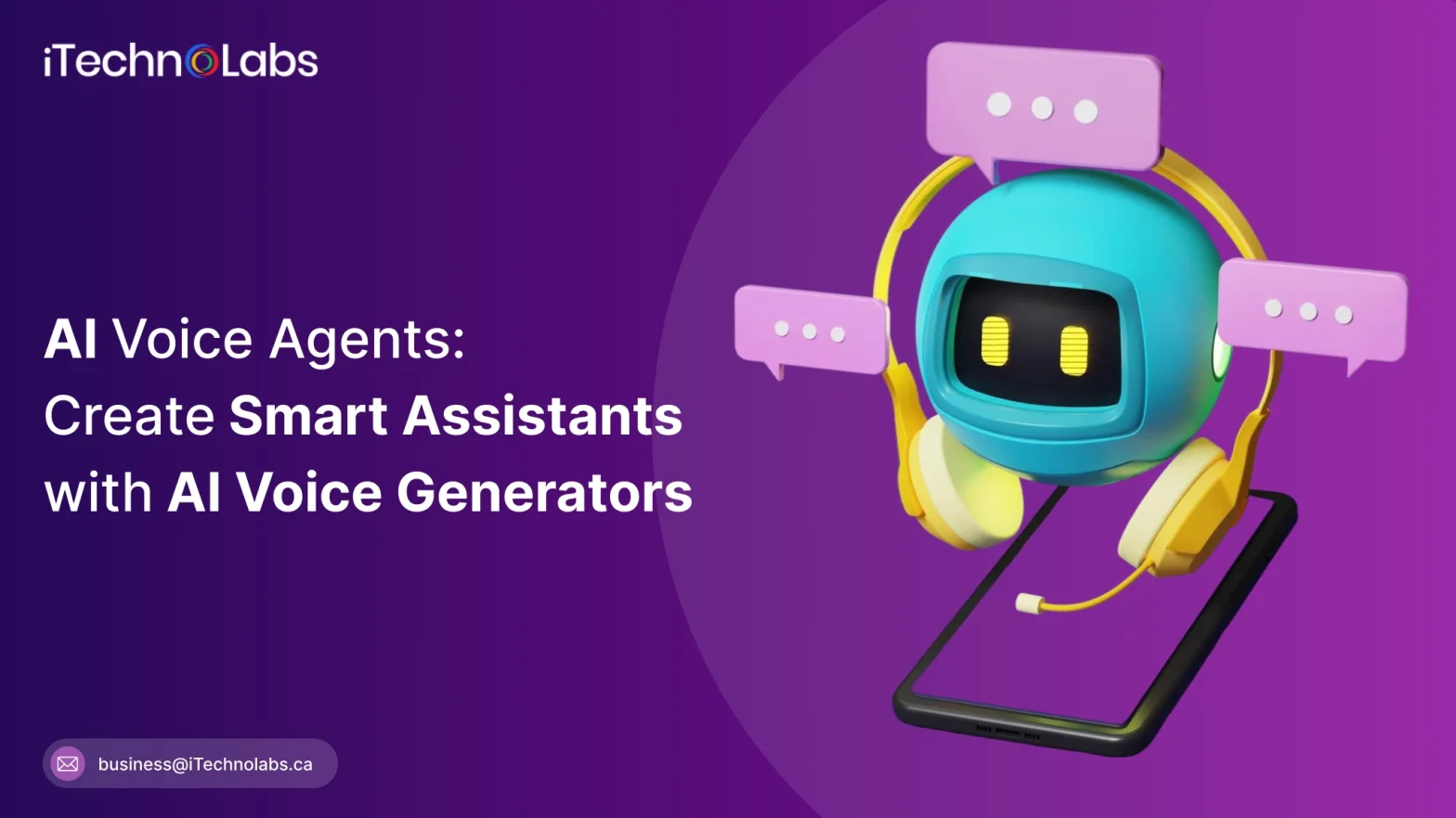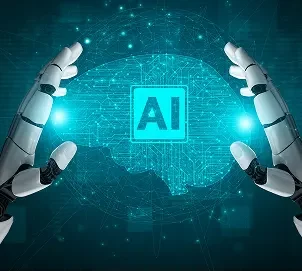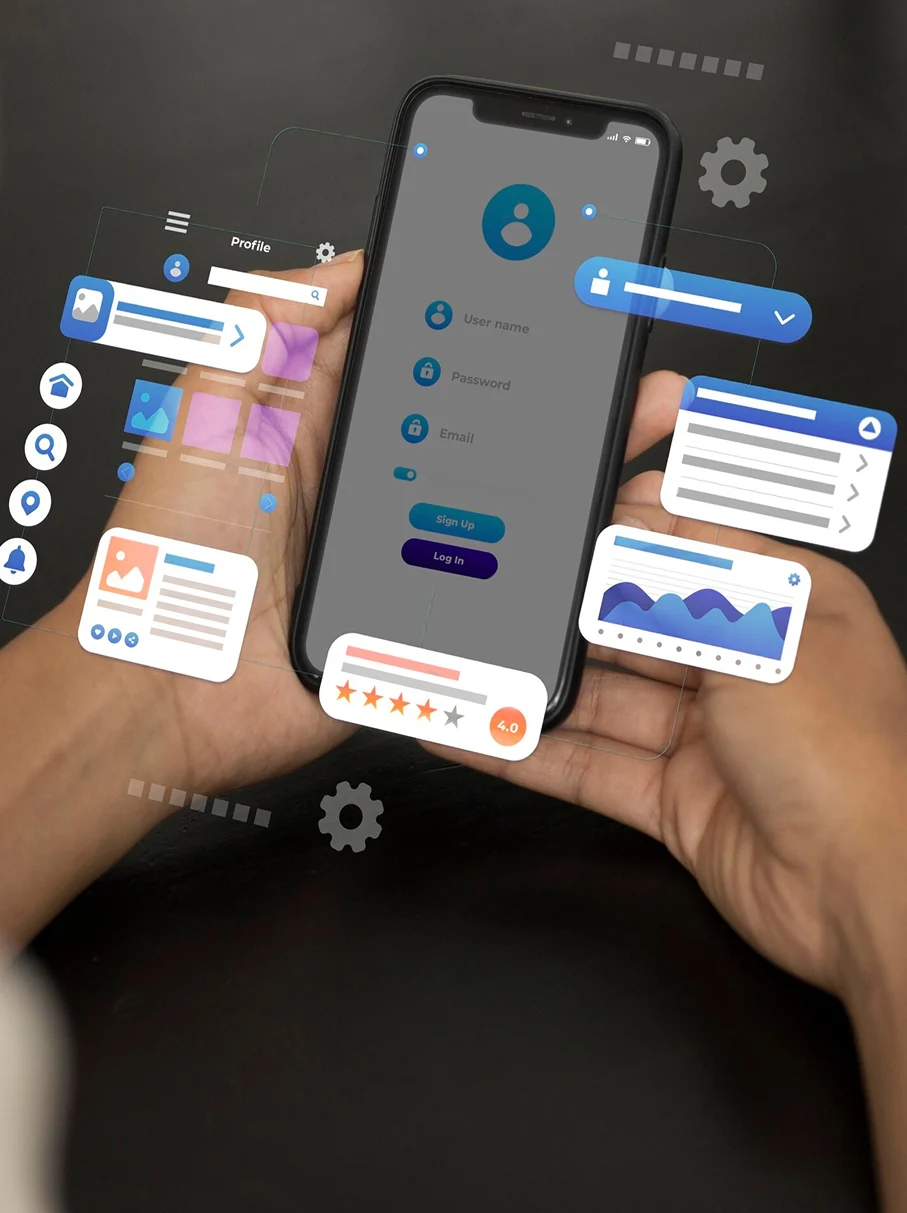Our interaction with technology develops much faster than ever. From smartphones and smart speakers to customer service chatbots, artificial intelligence (AI) is now embedded into our everyday lives. The most interesting new progress is AI voice agents. These smart assistants are driven by sophisticated algorithms and AI voice generators so that computers or machines can understand, treat and respond to human speech in natural ways.
Over 4.2 billion digital voice assistants were in use worldwide in 2023, and this number is expected to grow to 8.4 billion by 2027, almost equal to the world population.
People can now talk to a technique in the same way that they would to another human being, rather than being scared or entering a query. Companies embrace these solutions to improve customer service, streamline procedures and be available 24/7. For consumers, AI voices have become valuable assistants in the management of the schedule, checking smart homes and even learning new skills.
The blog will check how the AI voice agents work, the role of Ai Voice Generator, their benefits, real-world applications and this technology has been led.
Key Takeaways
- AI voice agents are automated accessories run by AI who naturally understand human speech, processes and reactions.
- AI voice generators play an important role in converting the text into a lifelike expression and human-like speech.
- Important properties include natural connection, multilingual support, emotions and reference adjustment, and scalability.
- Business costs, 24/7 availability, privatization and better customers benefit from satisfaction.
- Integration with future trends such as hyper-recognition, emotion recognition, multilingual conversation and IoT/AR/VR will make AI voice even more human and indispensable.
- Despite challenges such as privacy and conversion costs, the opportunities removed the risk.
- AI Voice Agents forms the future of customer service, health care, education and smart lifestyles, making digital interactions more comfortable and attractive.
What Are AI Voice Agents?
AI voice agents are digital assistants run by artificial intelligence that can communicate with people through spoken language. Unlike traditional robots, which depend on lesson-based entrances, voice agents take voice commands, analyze intentions and generate spoken reactions. Examples of AI voice agents include:
- Siri by Apple
- Alexa by Amazon
- Google Assistant
- Cortana (Microsoft)
They can respond to voice assistant women, play sound, set reminders, check smart devices and even manage business-related tasks such as ordering appointments or customer service assistance. These assistants are developed by using speech-to-text, natural language processing (NLP), and text-to-speech, which work together to provide a fluent human experience.
How AI Voice Agents Work
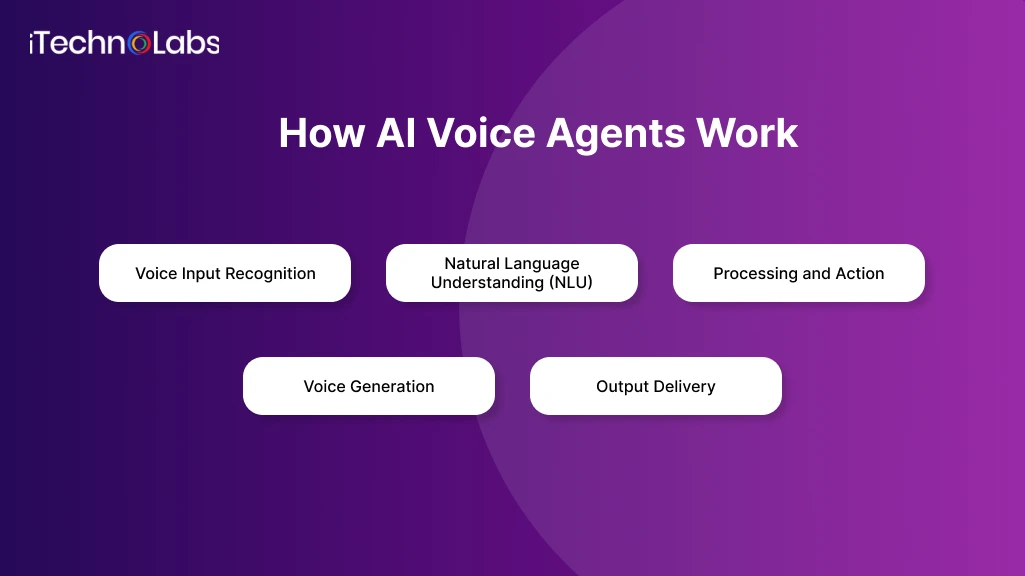
AI voices rely on a spontaneous chain of advanced technologies to simulate natural interactions. The process begins when a user speaks, and the system converts the voice to a text using speech recognition. Then it explains the intentions through natural language understanding (NLU). When the request is ready, AI processes the query, collects relevant data and prepares an answer. That reaction is turned into a human-like speech by the AI voice generator before it returns as a sound. The entire cycle occurs in real time, creating smooth, interactive experiences that feel comfortable and human.
1. Voice Input Recognition
When a user speaks, the device captures the sound and treats it using automatic voice recognition (ASR). This technique translates words into a written text, even accounting for accent or variation in accents. It creates the basis for communication between humans and AI systems.
2. Natural Language Understanding (NLU)
After converting speech to text, the system applies Natural Language Understanding (NLU) to identify meaning and context. For instance, if someone asks, “What’s the weather like tomorrow?” the AI interprets the intent by checking the weather and the context tomorrow, allowing it to respond accurately and appropriately to the user’s request.
3. Processing and Action
When the intention is identified, the AI system receives relevant information or implements a measure. It can query a database, connect to API or trigger smart device control. This step ensures that the assistant not only understands but also acts effectively in providing the right response.
4. Voice Generation
With processed data, AI creates a text-based response. Then, an AI voice generator converts this lesson to a speech that looks natural and attractive. Modern generators use deep learning to mimic human intimacy, emotions and rhythm, making the conversation feel more realistic than robots.
5. Output Delivery
Finally, the AI delivers the response back to the user through clear, conversational audio. This is the point where the user feels they are speaking to a human-like assistant. The quick and seamless process, often completed within seconds, creates smooth, interactive experiences with AI voice agents.
Suggested article: Top AI Development Tools and Frameworks Every Business Should Know
The Role of AI Voice Generators
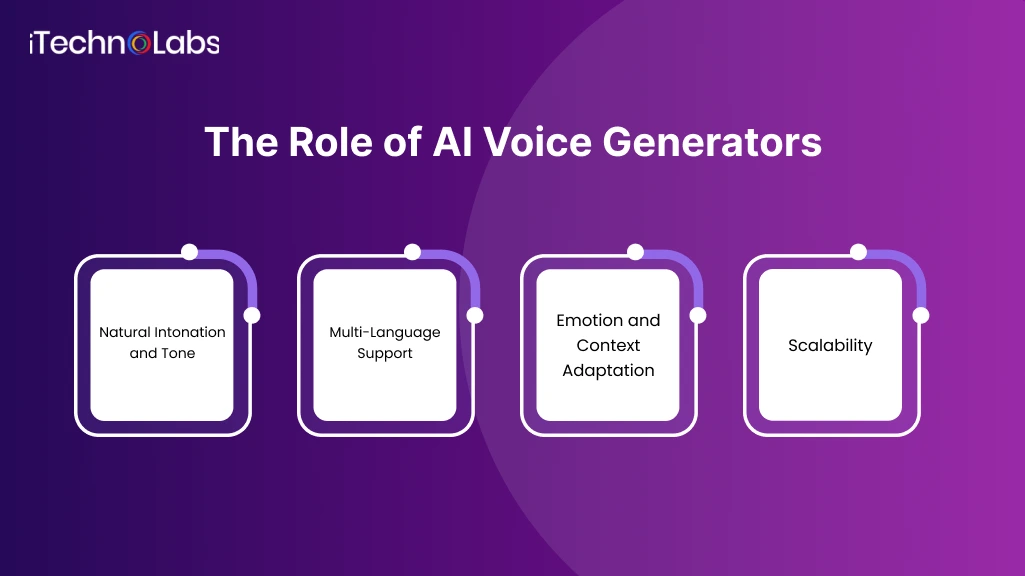
An AI voice generator is the technology that brings life to AI voice agents. Instead of robotic or monotone voices, modern voice generators produce speech that sounds natural, expressive, and engaging.
Key features of AI voice generators include:
1. Natural Intonation and Tone
One of the biggest successes of the AI voice generator is his ability to repeat human-like intonation and tone. Instead of producing flat, robotic sounds, these systems use advanced nerve networks to provide natural rhythm, stagnation and emphasis. This makes conversations more attractive and easy to understand, so users may feel that they interact with a real person instead of a machine.
2. Multi-Language Support
Modern AI voice generators are designed for a global audience. They can speak many languages fluently and are even compatible with different accents or dialects. This ensures that companies can communicate with customers all over the world without language barriers. For users, it provides accessibility and inclusion, which provides practical equipment in today’s rapid interconnected world for travel, customer support, education and cross-cultural communication for travel, customer support, education and cultural communication.
3. Emotion and Context Adaptation
Today’s AI voice generators go beyond simple conversion of word-to-sound in that they fit emotional references. A voice can be cheerful while providing good news, sympathetic in healthcare, or professional in professional interactions. By adjusting tones and emotions depending on the situation, voice agents create more individual and reliable interactions, promote trust and improve the user’s satisfaction in different customer service issues to entertainment.
4. Scalability
Unlike human agents who can only handle one conversation at once, AI voice generators frighten. A single AI-operated voice can handle millions of interactions at the same time without compromising on quality. This makes them an ideal solution for companies, which must serve large customer targets effectively at any time; the demand for extreme demand or global time regions offers steady, reliable and fast communication.
This technology is crucial because people connect better with voices that sound real and relatable. Businesses that use AI voice generators in customer service often report higher satisfaction levels.
Benefits of AI Voice Agents
The AI voice generator is the technique that provides their human quality to voice agents. They do more than just read lessons; They keep speeches that feel natural, expressive and favorable. With tasks such as realistic intimacy, multilingual flow, emotional reference awareness and infinite scalability, the AI voice generator makes the conversation even more attractive and more inclusive. This is the same that turns into a general digital accessory: a powerful tool for smart, relative peers and businesses.
1. Natural Intonation and Tone
One of the biggest successes of the AI voice generator is its ability to repeat human-like intonation and tone. Instead of producing flat, robotic sounds, these systems use advanced nerve networks to provide natural rhythm, stagnation and emphasis. This makes conversations more attractive and easy to understand, so users may feel that they interact with a real person instead of a machine.
2. Multi-Language Support
Modern AI voice generators are designed for a global audience. They can speak many languages fluently and are even compatible with different accents or languages. This ensures that companies can communicate with customers all over the world without language barriers. For users, it provides accessibility and inclusion, which makes voice agents practical tools for travel, customer support, education and cultural communication in today’s rapidly linked world.
3. Emotion and Context Adaptation
Today’s AI voice generators go beyond simple word-to-sound conversion; they adapt to emotional context. A voice can sound cheerful when delivering good news, empathetic in healthcare settings, or professional in business conversations. By adjusting tone and emotion based on the situation, voice agents create more personalized and relatable interactions, fostering trust and improving user satisfaction across various use cases, from customer service to entertainment.
4. Scalability
Unlike human agents who can only handle one conversation at once, AI voice generators frighten. A single AI-operated voice can handle millions of interactions at the same time without compromising on quality. This makes them an ideal solution for companies, which must serve large customer targets effectively at any time; the demand for extreme demand or global time regions offers steady, reliable and fast communication.
The Future of AI Voice Agents
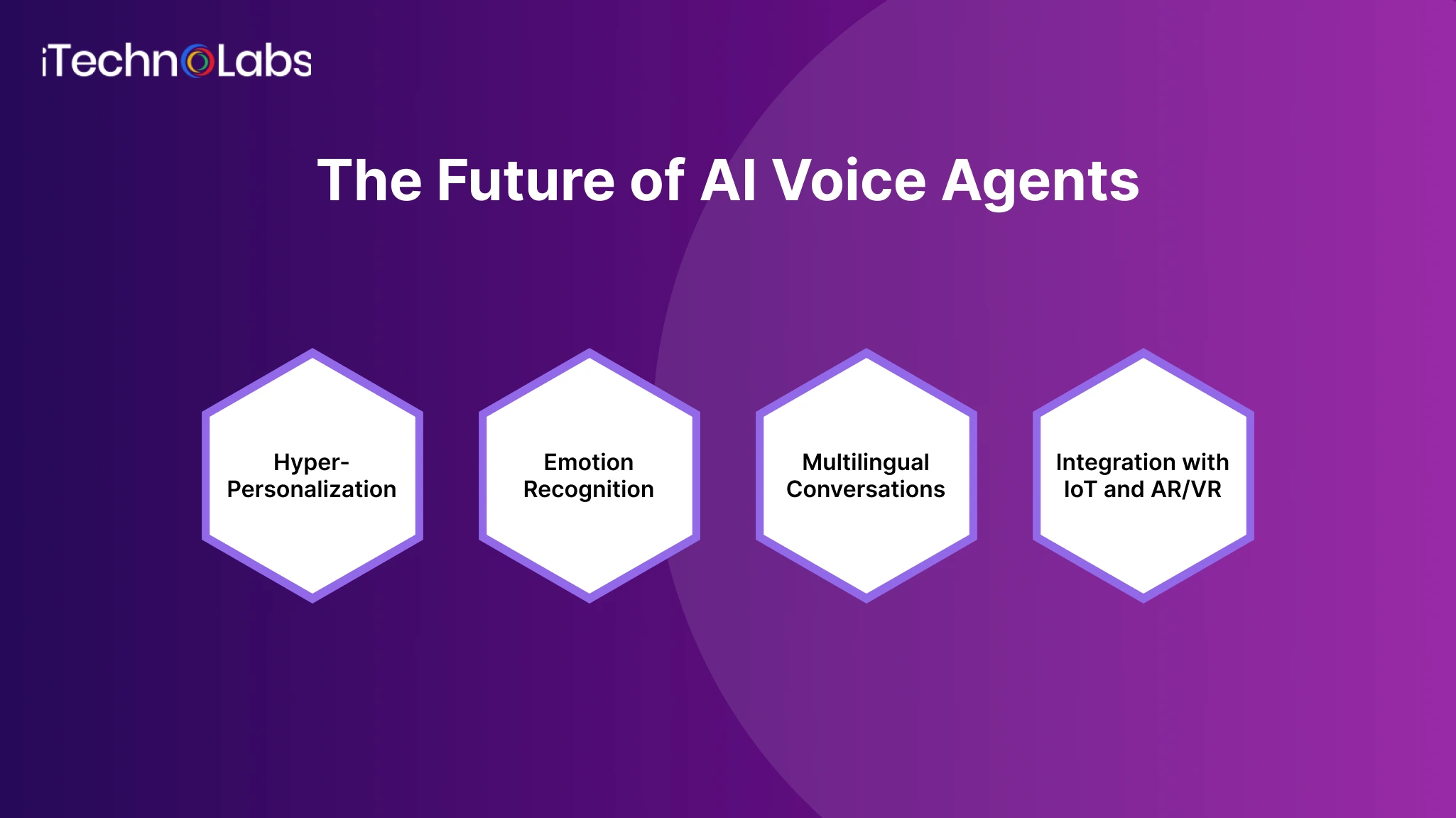
The future of AI Voice Agents is out of simple voice command and north. These assistants develop into intelligent peers who are able to predict the needs, identify emotions and communicate in real-time language. With intensive integration into IoT, AR and VR technologies, they will play a key role in creating immersive, personal and human-like digital experiences. Over the coming years, the AI voice agent will not only answer us but will also guess us, adapt and really understand us.
1. Hyper-Personalization
The next generation of AI voice agents will focus heavily on hyper-personalization. Instead of waiting for instructions, these assistants will anticipate user needs based on past behavior, preferences, and context. For example, they may remind you of an upcoming meeting, suggest healthier meal options, or even adjust smart home settings automatically. This proactive assistance will make daily life more convenient and create experiences that feel uniquely tailored to each individual.
2. Emotion Recognition
Future AI voice agents will be equipped with advanced recognition technology. By analyzing tone, pitch and speech patterns, they will detect the user’s mood, whether happy, stressed, or disappointed and react with sympathy. For example, a health assistant can use a quiet tone when talking to anxious patients. This ability to understand emotions will make the interaction feel more human and strengthen confidence between users and AI systems.
3. Multilingual Conversations
Language barriers will soon become a matter of the past when the AI voice agents achieve real-time translation properties. Imagine asking a question in English and answering the assistant immediately in French, Spanish or Mandarin depending on the listener. This will bring a revolution in global trade, travel and cross-cultural communication, making AI voice that are actually inevitable for the connected world where smooth multilingual interactions are ideal.
4. Integration with IoT and AR/VR
The AI voice agents are expected to integrate deeply with the Internet of Things (IoT) devices and immersive techniques such as Augmented Reality (AR) and Virtual Reality (VR). This means that you can control your entire smart home, detect virtual environment or navigate in AR-based learning experiences through a natural voice command. Such integration will push AI voice agents beyond help and push them to the extent of interactive, immersive digital peers.
As the AI voice generators become more advanced, these agents will become unmatched by human interactions, making them a powerful tool in both individual and commercial surroundings.
Important article: The Ultimate Guide to AI Development: From Fundamentals to Real-World Applications
Conclusion
AI voice agents are no longer science fiction; they change our way of living and working. Using the AI voice generator, these accessories look natural, adaptable and attractive, and people feel the interaction with machines.
AI voice agents provide facilities, privatization and cost savings, from simplifying daily tasks to revolutionizing industries such as health care, retail and education. Of course, there are challenges such as privacy and implementation costs, but the benefits remove the limits.
As technology develops, AI voice agents will become more intelligent, more sympathetic and more integrated into our lives. The future is where our voices will be the most important way to interact with the digital world, not the keyboard.
FAQs
1. What are the AI voice agents?
AI voice agents are smart assistants who use artificial intelligence to interact with users through spoken language. They treat the voice command, understand the intentions and react to natural, human-like voices using AI voice generators.
2. How do the AI voice generators work?
AI uses advanced machine learning models and natural language processing (NLP) to convert the AI Voice Generator text to realistic speech. Unlike the sounds of the Robot of the past, modern AI voice generators produce speech that seems natural, expressive and emotionally adaptable.
3. What are the benefits of AI Voice Agents for companies?
AI voice agents help companies:
- Reduce Customer Service Cost
- 24/7 availability offers
- Handle more questions at a time
- Individual experience
- Customer satisfaction through natural interaction
4. Can AI voice agents understand many languages?
Yes. Many AI voice support many languages and dialects. This makes them ideal for global businesses and individuals who need interdisciplinary communication.
5. Are AI voice agents safe to use?
Yes, the AI voice agents are usually safe, but users should be aware of privacy problems. Since these agents collect voice data, it is important to use reliable platforms that follow data security rules.

